Jul 9, 2024 11:35 AM
Trumpeter, Educator Jim Rotondi Dies at 61
Jim Rotondi, a renowned hard-bop trumpeter, composer and educator, died suddenly on July 7 at a hospital in France. He…
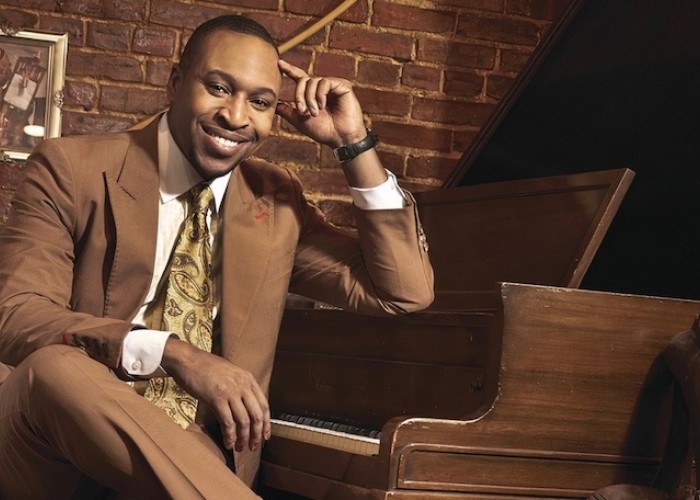
Aaron Myers
(Photo: Courtesy of DC Modern Luxury)When listening to Aaron Myers’ engrossing new release, The Pride Album, it’s nearly impossible not to think of the iconic novelist and essayist James Baldwin. Throughout the album, the Washington, D.C.-based singer, songwriter and pianist delivers songs bursting with personal and political poignancy, capped off with narrative and emotional clarity. And in conversation, Myers is as defiant about his bisexual orientation as he is about his Blackness.
Although Myers doesn’t cite Baldwin as a songwriting influence, he says he listened to the writer’s legendary debates and interviews constantly during his five-mile daily walks throughout the coronavirus pandemic. Myers applauds Baldwin’s tenacity at unspooling his multifaceted perspective as a Black gay man contending with white supremacy in America.
“[Baldwin] articulated things in a space where it was educational and unapologetic,” Myers said on an early May afternoon inside D.C.’s Busboys & Poets restaurant and bookstore. “And it was meant for you to fully understand his plight in which no one could leave the conversation without knowing the difficulties or the love that he was experiencing.”
Myers enlivens his lyrics, depicting America’s current racial strife (“The New Jim Crow”) and clenched-teethed resolve in the face of adversarial forces (“Don’t Ask Me To Smile”) with a gospel-fueled jazz sensibility that betrays his Goodlow, Texas, church upbringing.
“I also think about those old Black educators who taught in the school before integration. They always wanted you to be prepared so that no matter what audience you had to stand in front of, you were going to be solid,” Myers said of the inspiration behind his searing rendition of “Make Them Hear You.”
On the seething ballad “Don’t Ask Me To Smile,” Myers reflects on witnessing some of his older family members having to smile while the proverbial boot of Jim Crow laws was stomping them to the ground. “I remember, often, my grandfather and grandmother had to smile in circumstances where there was nothing to smile at,” he said. “Then I had to think of myself, of the many times I actually wore a smile to mask my pain — and specifically in front of the person who’s inflicting the pain. Then it goes further because they at times demand that you smile when they know they’re inflicting pain. And that’s where I had to draw the line.”
Other sociopolitical moments occur with Myers’ brisling covers of the gospel hymn “Down By the Riverside” and Bobby Timmons’ “Moanin’.” In turn, Myers offers levity with the festival instrumental “Return To Spain (Ode to Chick Corea)” and the amorous ballad “Let’s Fall In Love.” In sequencing the album, Myers explains that he wanted The Pride Album to unfold as if it were a “day in the life.”
The album’s beginning conveys someone waking up in the morning and taking in all the gloomy news regarding various sociopolitical injustices. “If you’re an empathetic individual, that news stays with you till about noon or 1 o’clock at least,” Myers argued. The mood, however, brightens during the rest of the afternoon. But when the evening comes, darker clouds emerge once again. “That’s when I thought about the times when you’re forced to reconcile stuff dealing with personal relationships.” Still, The Pride Album concludes on a bright note with the tender “Please Take Care Of You For Me” and the riveting, life-affirming title track.
Myers recorded The Pride Album during the pandemic as an act of survival. “I underestimated and undervalued how much my music was a part of my wellness plan in my mental health,” he explained before revealing that he struggles with cardiophobia. “I had an unhealthy fixation on death. But through therapy, I understand that my fixation on death is really my fixation on things that I cannot control. So, we decided to shift as a part of my wellness plan to things that I did have control over. The circumstances that I have, I don’t have control over all of it. But I do have control over articulating them. I do have control over how I sound the alarm. I do have control over writing it down and putting music to it.”
Ever since moving from Los Angeles to Washington, D.C., in 2008 — by way of working on Barack Obama’s U.S. presidential campaign as a field organizer — Myers has been a guiding light on the city’s bustling yet underappreciated jazz scene. In addition to being a singer and songwriter who performs regularly at Mr. Henry’s Restaurant and other local venues, he hosts a jazz show on the Pacifica radio station WPFW-FM, and he’s the co-founder (along with saxophonist Herb Scott, who appears on The Pride Album) of the jazz advocacy nonprofit Capitol Hill Jazz Foundation. Throughout those multiple, intersecting roles, Myers combines his knowledge of policy and politics with jazz to advocate for not just more resources to the arts but also for human rights across the spectrum.
He says that part of his tireless work on the D.C. jazz scene is due to his own selfishness. “I wanted to ensure that whatever industry I was working in was the strongest industry,” Myers said. “And there were some spaces and some gaps that were just blatant to me that would maybe not be obvious to others from a solution standpoint.”
Some of those gaps Myers cites are stronger, more 21st century-ready business structures — particularly public relations and local record labels — to bolster the profile of much of the city’s talent. The Pride Album certainly offers a glimpse of that brimming talent; it features a host of the District’s finest jazz musicians, such as Scott, pianist Samuel Prather, bassist Kris Funn, guitarist Stephen Arnold, drummer Dana Hawkins and singers Akua Allrich, Deborah Bond, Cash J and Earl Lloyd.
Myers was recently reminded of the District’s immense jazz talent pool when he toured Russia, where he saw pictures of his D.C. contemporaries hanging on the walls of jazz clubs. “I’ve gone to 20 cities in Russia, and in 10 of them I have seen pictures or been asked about D.C.-based musicians,” he said. “We need to be proud that we have exceptional musicians here in this area who are touring, and that there is actually a business here that can be encouraged and bolstered.” DB
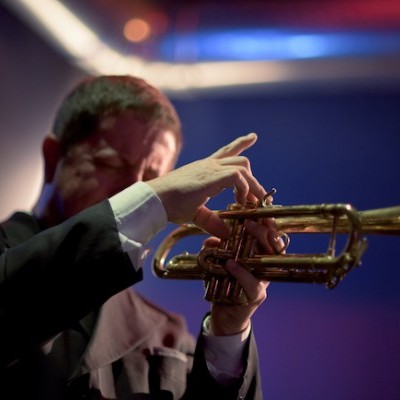
Jim Rotondi was acclaimed for his wide, round trumpet tone, remarkable virtuosity and assured swing.
Jul 9, 2024 11:35 AM
Jim Rotondi, a renowned hard-bop trumpeter, composer and educator, died suddenly on July 7 at a hospital in France. He…
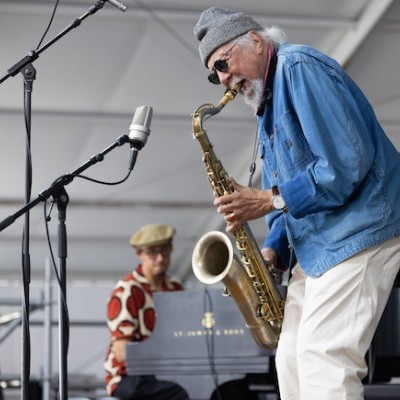
Charles Lloyd, seen here at the 2024 New Orleans Jazz & Heritage Festival, makes DownBeat Poll history!
Jul 11, 2024 12:23 PM
The incomparable Charles Lloyd swept the 72nd Annual DownBeat Critics Poll, becoming the first artist ever to earn…
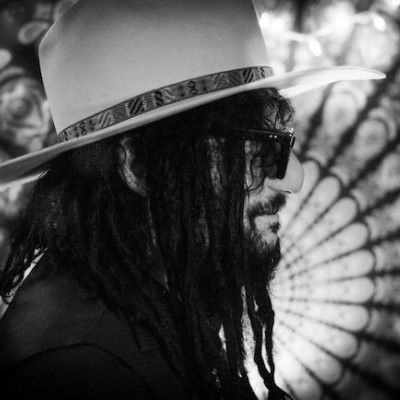
“Being president of Blue Note has been one of the coolest things that ever happened to me,” Was said. “It’s a gas to serve as one of the caretakers of that legacy.”
Jun 4, 2024 12:21 PM
Sitting with Don Was is a comfortable and unhurried exercise. He may seem slightly reserved at first, but ideas and…
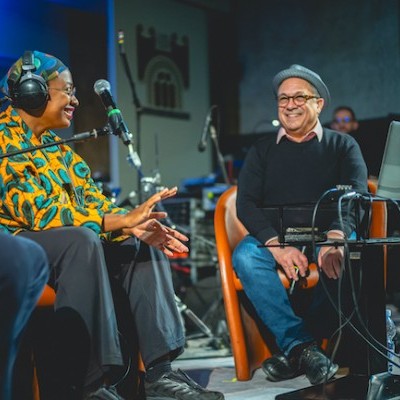
“She reminds me of my childhood and makes we want to cry,” Cécile McLorin Salvant, pictured here with writer Ashley Kahn, said of Dianne Reeves.
Jun 11, 2024 12:31 PM
Italy’s Umbria Jazz Winter is one of those rare annual festivals that not only coincides with a major holiday —…

Maria Schneider said of Decades, her new compilation release: “I just wanted to create something, put it in a beautiful box and say, ‘Look at what we did.‘”
Jun 18, 2024 12:00 PM
Maria Schneider opened the sleek black box and placed it on a coffee table in her Manhattan apartment. Inside lay the…